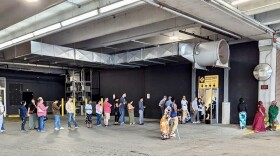When reporters Olivia Evans and Connor Giffin heard about complaints of mold inside the giant battery park project south of Louisville, they started digging in.
The Courier Journal pair spent months combing through state labor records, interviewing workers and piecing together a deeply reported investigation that lays bare an array of issues inside one of the state’s pet projects.
In this installment of Digging In, the reporters discussed how they got on the story and the work that went into uncovering a pattern of workplace injuries, mold contamination, a bat infestation and chemical exposure risks.
Click the audio player above to listen to the conversation.
This transcript is edited for length and clarity.
Jake Ryan: Earlier this month you published this really great story about the Blue Oval SK Battery Plant in Glendale. What did you find and what got you onto the story?
Olivia Evans: In early 2024 we discovered there was mold exposure at the plant. So, after we had requested those records and wrote a short story in 2024 we were continually requesting records and following up to see what the status of the plant was and where things were going at that point throughout the year, especially as it was leading up to production starting this year.
Connor Giffin: And the thing about these labor records is these are state investigations that are ongoing, and a lot of the time these preliminary records about how the investigation is going aren't releasable yet. So we have to kind of keep making requests as the investigations come along. And so that was most of last year, after the mold information became public, we were kind of going through those and that kind of culminated in this investigation this month.
JR: So what did some of the employees tell you all? What were they describing about their experiences inside this huge facility?
OE: We went down to Glendale and we spoke with workers in-person down there, and a lot of workers were telling us that, in general, they feel unsafe. There were lots of specific mentions about mold. There were mentions about uncertainty with what the chemicals were and how the chemicals were being used. Lots of concern was raised around PPE. The workers were telling us that they don't feel they're provided with enough PPE and the proper quality of PPE. The company has explicitly denied this multiple times and said that workers' claims that they don't have PPE are both false and malicious, but that's been something that workers shared with us. On top of that, workers were also telling us and providing medical documentation that their health was impacted by working at this plant. And so we had workers tell us — and be able to prove it with their medical documentation — that they were diagnosed with exposure to mold. One worker was diagnosed with asthma, and then after she was fired from the plant, within a few weeks of her firing, she had a medical checkup and her doctor noted that she no longer presented with asthma.
JR: How do you follow this story? What's next? The EV industry is a big thing that the state of Kentucky is investing in. Is it something that you continue to follow?
OE: Absolutely. The next thing, specifically, that we're looking into is the National Labor Relations Board has been hearing a contest from Blue Oval SK saying that the workers at the battery park in Glendale should not be able to unionize at this point. The workers filed for unionization earlier this year after launching a public campaign in late 2024. The NLRB should, at any point, be releasing its status for if the workers can move forward and have their union election, or if the company wins and the workers are not eligible to have a union election. So that'll be the next thing that I'm immediately looking into, because a lot of these health and safety concerns that the workers shared with us and raised is one of the key elements as to why they want to unionize.
CG: Something we heard from a lot of workers that we talked to was that they're not in full production yet, and so there's concerns that when they are in full production, some of these concerns could be amplified. If the safety issues aren't addressed before they're in full production, there could be more risk to workers.
JR: We’ll be looking for your stories, and we really appreciate the work.







